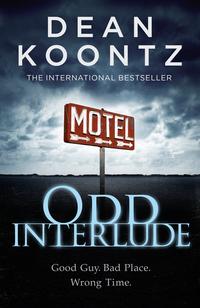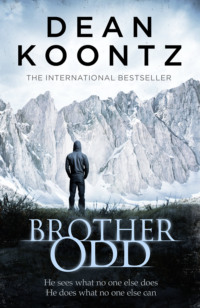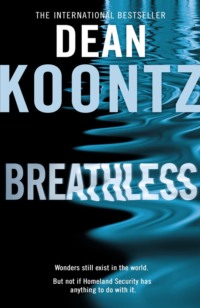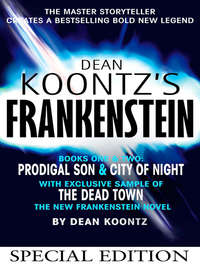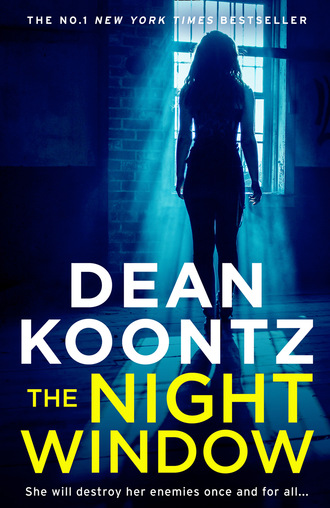
Полная версия
The Night Window
Mustafa is an ambitious thirty-two-year-old who intends one day to live in a mansion on Long Island Sound, in East Egg village, and be warmly welcomed by old-money society as one of their own. In the interest of remaking himself to fulfill his dream, he has petitioned Homeland Security to allow him to proceed in court to have his name changed to Tom Buchanan, but permission has not been granted, as the department is currently short of the number of employees with Arabic names that it needs to meet its multicultural quotas.
Charlie and Mustafa are adamantly not two of a kind, and yet they get along well. Charlie’s high-protein low-carb diet, augmented with eighty vitamin pills a day and regular drinks of Clean Green, is a Spartan regimen compared to Mustafa’s fondness for the richest French cuisine and his tendency to order two desserts with dinner. Charlie is six feet three and lean as a wolf, while Mustafa is five feet eight and as solid as a pit bull. Mustafa pursues only icy blue-eyed blondes, while Charlie will bed any good-looking woman as long as she likes a little pain and/or humiliation with her sex, which he is able to deliver in a most refined manner.
“What kind of deplorable neighborhood is this?” Mustafa asks with evident distaste. Although English is his second language, he has diligently bleached every trace of an accent from his speech. “They don’t remove the dead trees, and that lamppost looks as though it fell over months ago.”
Charlie says, “We’re at the extreme northern end of the valley, on the very edge of La Cañada. People who live here aren’t looking for downtown action.”
“Yes, well, if this Vikram fellow hacked millions of dollars from nine different government agencies, whatever is he doing in a place like this?”
“Perhaps,” Charlie said, “he thinks it’s the last place we’d ever look.”
“With all the money he tweaked out of the system, why would he choose to live with an uncle and aunt?”
“Maybe because he likes them.”
“They must be a wildly entertaining couple if he’s willing to settle in a backwater like this.”
Long in preparation for his ascendancy to the social heights of East Egg, Mustafa carries a cordless razor with which he freshens his shave every three or four hours, wears a cologne so subtle that one is not consciously aware of its scent, and sleeps every other night with whitening strips affixed to his teeth. A cosmetic surgeon has refashioned his proud Arabic nose into something Mustafa thinks British and suggestive of English blood in his family tree dating to the age of colonialism. The hair between the knuckles of his fingers has been removed by electrolysis, and his nails are at all times so well manicured that his hands resemble those of an exquisitely detailed mannequin.
Now those hands suddenly tighten on the steering wheel. Mustafa brakes almost to a full stop, so that behind them the headlights of the Cadillac Escalade, which carries three other agents on Charlie’s four-man team, flare brightly in the tailgate window of the G550. He points to a large white sign with black lettering. “What do you make of that?”
DANGER
PROCEED AT RISK
PAVEMENT FAULTS
SLIDE ZONE
“There were wildfires last summer and heavy rains this winter,” says Charlie. “Always a bad combination. Let’s have a look.”
Here and there a swath of pavement is missing, as if it’s been sloughed away by torrents of racing water, and in its place is a temporary rampart of compacted soil topped with gravel. At each of these points, the hillside to the right is a steep slope of raw earth perhaps inadequately restrained by a makeshift retaining wall of portable concrete barricades. Otherwise the pavement is either in decent condition or only fissured and potholed.
Some streetlamps are missing, others are fallen over, and all are dark. For the last few blocks, the residences have been only on the left side of the street, many with lights aglow. Now the houses are dark and without landscape lighting. Some are surrounded by recently erected chain-link fences bearing signs sternly warning against trespassing.
The seventh and last of the dark structures is the address at which they expect to find Ashok, Doris, and Vikram Rangnekar—aunt, uncle, and the nephew who is a fugitive from the law. It is an enormous residence on at least an acre, standing among live oaks, the style of its architecture not definable in the gloom. This property is also fenced with chain-link unsuitable to an upscale neighborhood. Beyond the gate, a Mercury Mountaineer is parked in the driveway.
When Charlie and Mustafa get out of the bespoke G550 Squared, soft sheet lightning flutters through the rumpled clouds, as though a bright winged legion above the pending storm is hastening to the Apocalypse. There is no thunder flowing in the wake of the flying flame, and the night is uncannily still, all wind deep in a pocket of the storm, waiting to be spent.
The three men from the Cadillac precede Charlie and Mustafa to the gate in the fence: Pete Abelard, Hans Holbein, Andy Serrano. Pete and Hans have cleared their sport coats from belt holsters, and each has a hand on the grip of his weapon, ready to draw and fire, although Vikram Rangnekar is not considered likely to be violent.
By the time Charlie follows the trio, a man has exited the Mountaineer in the driveway. He has come to the farther side of the gate, through which he is speaking to Andy Serrano, who has flashed his FBI badge rather than Homeland ID, because in spite of several unfortunate recent directors, the Bureau is still held in higher regard by the public than is Homeland. Andy is shining a flashlight on this fortysomething Latino, who seems neither in awe nor afraid, his stance relaxed and his face composed.
Because this Latino—Jesus Mendoza—appears unarmed and cooperative, Charlie moves to the gate and shows his badge and takes charge of the scene. As Mendoza swings open the barrier at Charlie’s demand, he denies knowing anyone named Rangnekar and insists that the owners of the property are Norman and Dodie Stein, who have been his employers for nearly twenty years. He is a full-time gardener and jack-of-all-trades.
On his smartphone, Charlie has photos of Ashok, Doris, and Vikram, which he shows to Mendoza.
“No, sir. Not him. Not her. No, sir, not him, either. I haven’t ever seen these people.”
According to Bureau investigators, Vikram Rangnekar formed a limited liability company, Smooth Operator Development, twenty-six months earlier. Two months thereafter, Smooth Operator formed a limited partnership called Chacha Ashok. Chacha is Hindi for uncle, specifically for an uncle who is your father’s brother. Sixteen months ago, Chacha Ashok, L.P., had purchased this residence in La Cañada Flintridge.
“This house,” Charlie assures Mendoza, “is on the property-tax rolls as owned by a limited partnership controlled by Vikram and Ashok Rangnekar. Ashok and Doris Rangnekar are also registered to vote in this district.”
“There is some terrible mistake, sir. I am sad to say you have been misled. But then I know nothing of taxes and voting. To me, politics seems like a sickness, and I own no house. Until two months ago, I lived here, in an apartment above the garage.”
Mendoza is polite, self-effacing, but he lacks one quality that Charlie most appreciates in citizens with whom he must interact in situations like this. Although Mendoza is humble, he is not meek. Humility is good; Charlie Weatherwax expects any subject of an interrogation to be no less than humble, but humility is not enough. In urgent cases like this, he never trusts an interrogee until he has reduced him all the way to meek submission.
He puts away his smartphone and looms over Jesus Mendoza, who is even two inches shorter than Mustafa al-Yamani. He makes a point of exaggerating the Spanish pronunciation of the man’s name, calling him Hey-Seuss, emphasis loud on the first syllable, as if he is calling out to the author who wrote How the Grinch Stole Christmas. “Hey-Seuss, is it? Listen to me, Hey-Seuss, and listen good. If you’re covering for Vikram Rangnekar, Hey-Seuss, I’ll bust your skinny ass and put you away in some shithole of a federal prison for ten years. We’re going to search this place from top to bottom, Hey-Seuss, and you will assist us without delay.”
Mendoza smiles and shrugs. “Of course. We know that the law is good, if a man use it lawfully.”
As sheet lightning fluoroscopes the body of the impending storm and shadows like revealed malignancies briefly caper around Charlie, he senses that he has been rebuked. “Exactly what’s that supposed to mean?”
Instead of answering the question, Mendoza says, “Because of recent mudslides, the city has condemned the property. Mr. and Mrs. Stein are contesting the condemnation in court. Deep caissons can be installed, retaining walls built, the home saved. If the law will allow. Meanwhile, no one is permitted to live in the house.”
“So what are you doing here?” Charlie asks.
“Sir, you see, I can no longer garden or make repairs. I work the night to keep out vandals who might damage the house before it can be saved.”
“Do you think we will vandalize the place, Hey-Seuss?”
“No, sir. Of course not. You are the law. Come with me. I will show you there is no Rangnekar and never was.”
Конец ознакомительного фрагмента.
Текст предоставлен ООО «ЛитРес».
Прочитайте эту книгу целиком, купив полную легальную версию на ЛитРес.
Безопасно оплатить книгу можно банковской картой Visa, MasterCard, Maestro, со счета мобильного телефона, с платежного терминала, в салоне МТС или Связной, через PayPal, WebMoney, Яндекс.Деньги, QIWI Кошелек, бонусными картами или другим удобным Вам способом.



